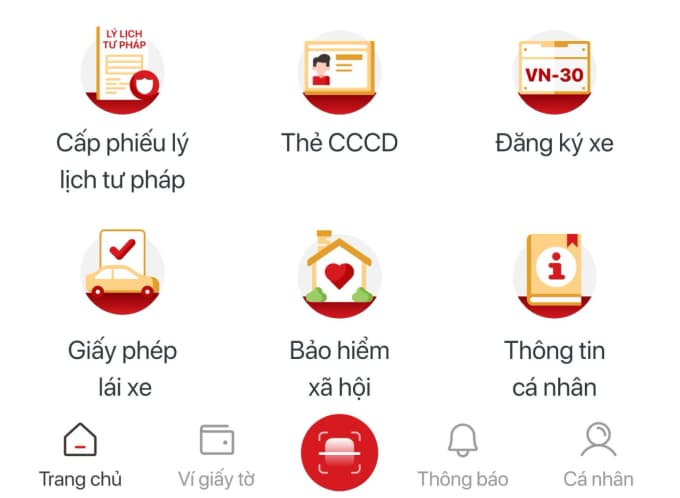What are the guidelines on application for issuing judicial records on VNeID in 2024? How to register for issuance of judicial record cards on VNeID?
What are the guidelines on application for issuing judicial records on VNeID in 2024? How to register for issuance of judicial record cards on VNeID?
From April 22, 2024, Vietnamese citizens can quickly and conveniently apply for judicial records on VNeID.
Hanoi and Thua Thien Hue provinces are the first two localities to pilot the procedure of issuing judicial record cards on VNeID from April 22, 2024, following these 7 steps:
Step 1: Access the VNeID application, go to the Administrative Procedures section, select the utility "Issue judicial record cards".
After entering the application password, in the interface of issuing judicial record cards, select "Create new request" (Note: citizens will not be able to create new requests in the following cases: Citizens have registered previously and the status of the application is being processed/Citizens have registered previously but have not made the payment for the application fee).

Step 2: Select the subject to be issued judicial record cards
Step 3: Enter administrative procedure information and result information.
Under the "Implementing Agency" section, citizens select either the Hanoi Department of Justice or the Thua Thien Hue Department of Justice, depending on their place of residence. If the citizen is a Vietnamese citizen or a foreigner who is currently residing in Vietnam; state agencies, political organizations, or social-political organizations, select judicial record card no. 1.
If it is a judicial agency requesting judicial record cards for investigation, prosecution, trial purposes, or individuals who need to know the content of their own judicial records, then select Form No. 2.
Citizens choose the purpose of issuing judicial record cards such as supplementing civil servant records, study abroad records, job application records, supplementing business professions with conditions, issuing visas for foreign travel, foreign residence, marriage to foreigners, etc
In addition to the electronic version issued on VNeID, citizens can choose to issue additional paper copies and receive them at the local single-window departments or have them sent to their home via postal service.
Citizens also need to provide complete information such as place of birth, email, phone number, and address to receive the paper copy.
Step 4: Confirm the information
Check the information, tick the box "I declare that the statements made are true and I take responsibility for my statements" and press "Submit application".
Step 5: Confirm the application fee payment.
Press "Payment" to proceed to the bank account information input screen.
The fee for providing judicial record information is 200,000 VND. Citizens requesting an additional 2 copies of judicial record papers will not incur additional fees, and from the third copy onwards, an additional fee of 5,000 VND per copy will be charged.
Step 6: Confirm the information sharing.
Tick the box "I have read the purpose of data sharing, data processing, rights, obligations of data subject, and agree to share, process personal data," then select "Confirm".

Step 7: Pay the application fee.
Enter the required information and select "Continue". Select "Cancel" if you do not wish to proceed with the payment.
Valid applications through VNeID will be processed within 10 working days.
The trial period for issuing electronic judicial record cards on VNeID will last for 2 months before nationwide implementation.
Source: Government Electronic Portal

What are the guidelines on application for issuing judicial records on VNeID in 2024? How to register for issuance of judicial record cards on VNeID?
What are the contents of judicial record cards in Vietnam?
Judicial record card No. 1
Pursuant to Article 42 of the Law on Judicial records 2009, Judicial record card No. 1 include the following contents:
- Full name, sex, date and place of birth, nationality, place of residence, serial number of the identity card or passport of the person to whom the judicial record card is issued.
- Previous criminal conviction:
+ For an unconvicted person, the words "no previous criminal conviction" shall be written. For a convict who has insufficient conditions for remission of his/her previous criminal convictions, the words "with a previous criminal conviction." the committed crime, principal and additional penalties shall be written;
+ For a person whose previous criminal conviction has been remitted and for whom information on remission of previous criminal conviction has been updated in his/her judicial records, the words "no previous criminal conviction" shall be written;
+ For a person eligible for amnesty and for whom information on amnesty has been updated in his/her judicial record, the words "no previous criminal conviction" shall be written.
- Information on the ban on holding of certain posts or establishment or management of enterprises or cooperatives:
+ For a person not banned from holding certain posts, establishing or managing enterprises or cooperatives under a ruling on bankruptcy declaration, the words "not banned from holding certain posts, establishing or managing enterprises or cooperatives" shall be written;
+ For a person banned from holding certain posts, establishing or managing enterprises or cooperatives under a ruling on bankruptcy declaration, posts subject to the ban and the duration of the ban on establishment or management of enterprises or cooperatives" shall be written.
In case individuals, agencies or organizations make no request, details specified in this Clause will not be written in judicial record cards.
Judicial record card No. 2
Pursuant to Article 43 of the Law on Judicial records 2009, Judicial record card No. 2 include the following contents:
- Full name, sex, date and place of birth, nationality, place of residence, serial number of the identity card or passport of the person to whom the judicial record card is issued, and full names of his/her parents and spouse.
- Previous criminal conviction:
+ For an unconvicted person, the words "no previous criminal conviction" shall be written.
+ For a convict, his/her remitted previous criminal conviction, time of remission, previous criminal conviction not yet remitted, date of judgment pronouncement, serial number of the judgment, the court which has pronounced the judgment, crime, applicable article(s) and clause(s) of law, principal and additional penalties, civil obligation in the criminal judgment, court fee, and state of judgment enforcement.
In case a person is convicted under different judgments, information on his/her previous criminal convictions shall be written in the temporal order.
- Information on the ban on holding of certain posts or establishment or management of enterprises or cooperatives:
+ For a person not banned from holding certain posts, establishing or managing enterprises or cooperatives under a ruling on bankruptcy declaration, the words "not banned from holding certain posts, establishing or managing enterprises or cooperatives" shall be written;
+ For a person banned from holding certain posts, establishing or managing enterprises or cooperatives under a ruling on bankruptcy declaration, posts subject to the ban and the duration of the ban on establishment or management of enterprises or cooperatives shall be written.
What is the time limit for issuance of judicial record cards in Vietnam?
Pursuant to the provisions of Article 48 of the Law on Judicial records 2009, regulations on the time limit for issuance of judicial record cards are as follows:
Time limit for issuance of judicial record cards
1. The time limit for issuance of a judicial record card is 10 days after the receipt of a valid request. In case a person requested to be issued a judicial record card is a Vietnamese citizen who has resided in different localities or once resided overseas, or a foreigner specified in Clauses 2 and 3. Article 47 of this Law, and in case of necessity to verify the conditions on automatic remission of previous criminal convictions specified in Clause 3, Article 44 of this Law, the time limit is 15 days.
2. In case of emergency specified in Clause 1, Article 46 of this Law, the time limit is 24 hours after the receipt of a request.
Thus, the time limit for issuance of a judicial record card is 10 days after the receipt of a valid request; in case of necessity to verify some conditions, the time limit is 15 days.
In case of emergency, competent persons of procedure-conducting agencies may request the issuance of judicial record card No.2 within 24 hours after the receipt of a request.
LawNet